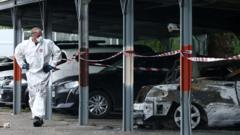In a series of 12 coordinated attacks on French prisons, government officials believe drug gangs are behind the violence, reacting to tougher laws targeting drug trafficking. Interior Minister Bruno Retailleau emphasized the government's commitment to combat these gangs, highlighting a strategic plan to cut into their operations as part of a broader crackdown.
French Prisons Under Siege: Rising Threat of Drug Gangs

French Prisons Under Siege: Rising Threat of Drug Gangs
Recent assaults on French jails, marked by arson and gun violence, raise concerns about powerful drug gangs retaliating against government crackdowns.
In a dramatic upheaval, French prisons have recently faced violent assaults, leaving authorities and citizens on edge. With 12 reported attacks since Sunday night, the response to this unprecedented threat raises eyebrows and questions about the influence of drug gangs within the country.
Official investigations remain open to various lines of inquiry, with extremists or foreign interference not ruled out. However, the prevailing conviction leans toward the involvement of drug gangs retaliating against the government's renewed dedication to combat drug trafficking. Speaking on Thursday morning, Interior Minister Bruno Retailleau asserted, "What we're dealing with is the drugs-yobs [in French, narco-racaille]. We declared war on them with our new law on drugs trafficking. They know we're going to be hitting their wallets."
Over the course of three nights, gangs executed a well-coordinated plan involving car fires outside prisons and a prison officer training facility, and utilized firearms in two separate incidents. Symbols of graffiti referencing "DDPF"—Droits des Prisonniers Français (Rights for French Prison Inmates)—have become a common sight at these attack locations.
The emergence of this previously unknown group, DDPF, came to light when a video surfaced on Telegram featuring the destruction of a prison officer’s vehicle. The video claimed that Justice Minister Gérard Darmanin had "declared war" on prisoners, but it notably contained numerous grammatical errors, indicating a lack of sophistication not usually associated with far-left or anarchist groups.
As investigators work to decipher the motivations behind the violent actions, they note that videos of the assaults featured individuals resembling more typical drug gang operatives than traditional left-wing militants. Additionally, a mix-up with the initials used—DDFM instead of DDPF—hints at a disjointed message or agenda among the perpetrators. Despite speculation about potential foreign manipulation regarding the attacks, such as Russian interference, investigators are prioritizing the drug gang theory due to its straightforwardness regarding means and motives.
The current French government, featuring a unified interior and justice ministry focused on tackling the drug crisis, is pushing through a bill that seeks to significantly disrupt drug operations. This legislation proposes a specialized prosecutors' branch, bolstered investigatory powers, and enhanced protections for informants. Furthermore, newly converted high-security prisons are set to house the country's most powerful drug figures, with strict regulations on communication and visitation to curb illicit behavior from within.
The recent attacks signal a potential turning point, suggesting that drug gangs may feel threatened by heightened governmental efforts against their operations. Observers are eager to see if authorities can apprehend those responsible, with ongoing investigations suggesting progress may be imminent.




















